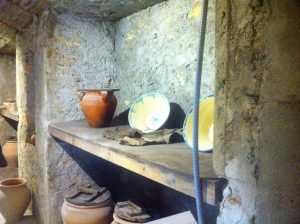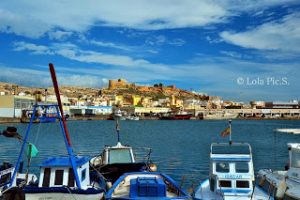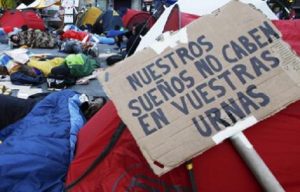En rejseberetning af Ron Ridenour: “Sojurn in Spain” – Med Collager af Jette Salling – 3. afsnit
KPnetBlogs bringer en spændende rejseberetning som sommerføljeton i 7 dele skrevet af Ron Ridenour med collager af Jette Salling. De to har besøgt Spanien og videregiver her tanker og indtryk fra landet – om politikken, historien, naturen og menneskene de har mødt. Teksten er på engelsk. Afsnit 4 udgives onsdag d. 26. juli.
Her følger afsnit 3. Se link til de tidligere afsnit nederst
3. ALMERIA AND PODEMOS
Jette and I spent a few days in Almería on our way to Barcelona. We immensely enjoyed some of this province’s natural beauty, such as, Siren Reef whose hooded seals’ cries in the night are said to have caused sailors to talk of mermaids. The nearby Cabo de Gata natural park is a UNESCO Biosphere Reserve. At the shoreline Europe’s only truly hot desert merges with crystal clear waters. And the ochre-hued desert with volcanic rock formations offer ideal location sets for many Western adventure movies.
As at Granada and Málaga, Almería has a hillside Alcazaba. It was built during the 10th century under the reign of Córdaba Caliphate Abd al-Rahman III. The Muslim rich and powerful enjoyed private gardens and baths just like the Romans who also ruled the area earlier.
When Spanish kings’ armies re-conquered all of Spain, they had towering churches built on or beside Muslim temples. But some of the churches are less pompous. We visited one to hear music students sing several classic composers’ works. Our spirits tingling, we then relished the best of tapas for no more than the price of a beer, a glass of wine or even a soda. Almería province may be the last area in Spain where tapas are gratis with one’s drink.
Almería has Spain’s most intact underground shelter open to the public. This refuge has one of the largest of tunnels, 4.5 kilometer-long. It could hold 35,000 of the 50,000 inhabitants (10,000 had fled from bombings of Malaga). There were several entrances from churches, the hospital and elsewhere. The nine-meter deep tunnels are divided into several galleries. A make-shift clinic for emergency surgery was made. There was also a “playground” for children, and a kitchen. Franco, Hitler and Mussolini bombed the town 52 different times from the air and sea. On May 31, 1937, German warships left 40 dead and 150 injured. Two-hundred buildings were destroyed. The Refuge of Almería is a living historical memory of war’s atrocities for all of Spain, and foreign visitors too.
 The kitchen area inside the Almería Refuge.
The kitchen area inside the Almería Refuge.
Pepe Crespo and I had met through the internet and collaborated on some of Noam Chomsky writings. Pepe translated an essay I wrote on Chomsky’s work. He is a satirist whose website contains a wide range of political commentary and humor. https://elchiroilustrado.blogspot.dk/
Pepe’s father, Pepe Senior, was a champion underwater spear fisherman. Like millions of Spaniards he is a tapa epicure. One of the family’s favorite tapas locations is Entremares in Almería where Lola, Pepe’s wife, has one of her photos adorning one whole wall. Pepe Senior’s favorite tapas bar-restaurant is La Bodega del Jamón in Aguadulce where we ate luscious tapas with prawns, cod, mackerel, cuttlefish even tuna and marlin, helped down with delicious wines of all colors and at reasonable workers prices. All the while we conversed about Spain’s greatest writer, Cervantes, and his “Don Quijote de la Mancha”. A few months before Spain and UNESCO celebrated Cervantes, who died 400 years ago. The event caused Pepe Senior to re-read the book for the sixth time.
 Amateur photographer Lola’s take on Almería harbor and city center hanging in Entremares tapas bar.
Amateur photographer Lola’s take on Almería harbor and city center hanging in Entremares tapas bar.
Her blog: http://lolapicss.blogspot.dk/2013/
We exchanged memories and views of our readings of this great pearl in world literature, considered the first modern novel. In that period of Spain, the 16-17th centuries, the nation was a mixture of royalists and elitist-invaders of others’ worlds, fanatic Catholics who invented the inquisition to torture “heretics” for exercising free speech or arguing for women’s rights. The nobility enslaved others to do their work for them. There were also dreamy-eyed adventurers and mystics who might bray at windmills: And there were people of other ethnicities longing for liberation and sovereignty—people indigenous to Galicia, Andalusia, Basque land, Catalan. Their desire for liberation continues today.
When I lived in Cuba (1988-96), working for Cuban media, the “Morning Star” and free lancing, the revolutionary icon Fidel Castro was seen as a Don Quixote—a knight for the people who wielded his sword against the goliath, and actually won. The dreamer who could be effective enough to win and establish a system oriented to improve life for the masses, which, in fact, it did in many important ways.
Miguel de Cervantes was actually born to a family from Galicia. Before he became a writer, he was a soldier. He joined Admiral Don Juan d’ Austria’s “Holly Alliance” fleet in a huge battle against the Ottoman Empire, in 1571. Cervantes was seriously wounded in the chest and one hand was maimed. Nevertheless, he continued serving Pope Pius V and the “most Catholic of kings”, Philip II of Spain. Captured and enslaved by Turks, in 1575, he was ransomed and freed in 1580. Cervantes later began writing poems and novels. The first part of “Don Quixote” was finished in 1605.
Don Quixote is a fantasy-inspired would-be knight, who battles at windmills and sees agave purity in the ordinary peasant Dulcinea. His idealistic world merges with his employed squire Sancho Panza’s realism. There could be something in this story that mirrors contemporary Spanish Establishment attitudes of “real politics”, and Podemos whose uproar roots stem from Los indignados (The Outraged). The movement started with anti-austerity actions, May 15, 2011.
Pepe introduced me to Podemos in 2014. He is a member and his family votes for them too.
Los indignados took their inspiration from the Arab Spring uprising and a pamphlet written by a former resistance fighter, 93-year old Frenchman Stéphane Hessel. His booklet, “Time for Outrage” is a call to peaceful civil uprising (including civil disobedience) against finance capitalism and the economic crises it causes. The booklet also inspired the Occupy Wall Street movement.
Podemos had surprisingly won five seats to the European Parliament in January 2014, soon after forming. In less than two years, Podemos grew to over 250,000 members when it participated in its first national elections, December 2015, on an anti-austerity social reformist platform. It nearly doubled its membership by 2017. Its leaders are mainly young academics, principally Pablo Iglesias and Inigo Errejon. They were left socialists critical of Communist parties’ doctrine. Podemos stood for a republic and withdrawal from NATO, but the issue of NATO has faded into the background.
 Los indignados 15 May, 2011 action, Plaza del Sol, Madrid. “Our dreams can’t fit in ballot boxes.”
Los indignados 15 May, 2011 action, Plaza del Sol, Madrid. “Our dreams can’t fit in ballot boxes.”
Many Spaniards, who normally vote for one of the two leading parties, center-rightist PP and supposedly social democratic PSOE, were angry with their corruption and support for finance capitalism. Spain has the most unequal economy in Europe: six million workers without jobs, 50% unemployed youth; 14.3% in poverty placing it number 16 of the world’s 18 most developed economies. Yet the government cut 37% of its resources destined for the social network.
Podemos received the votes of many of those affected, in all over 5.5 million, 20.7% of all voters. The PP lost its absolute majority down 64 seats from 186.There are 350 seats in the House of Deputies, which has more significant power than the senate. The PSOE lost 20 seats from 90.
Because there was no majority to govern, another election was held in June 2016. Podemos united with the more traditional left party, United Left (Izqueirda Unida). Instead of increasing votes, the United Podemos coalition lost a combined 3.3% of votes yet held onto the same amount of seats, 71. The PSOE lost five seats. Surprisingly the PP gained 14 seats, garnering 33% of the vote. So now, the PP continues to rule without a majority. Most Spaniards do not want yet another election.
Podemos engaged in an open inter-party debate. Three lines were formed. When the party congress met to elect councilors and vote for leadership, the Pablo Iglesias-led group won 37 seats. The second group, that led by Inigo Errejon, took 23, and the more radical anti-capitalists led by Andalusian Miguel Urban won only two seats.
Secretary General Iglesias won 89% of the vote to continue as the leader, and immediately set course in one reformist direction. He replaced Errejon with Irene Montero as councilor leader.
Podemos is of international interest among leftists of all tendencies. But some “real leftists” are disturbed with Podemos’ tendency to skirt important issues just as Bernie Sanders is criticized for not opposing US wars and NATO. Reneging on working class programs by left-wing parties is epidemic in the world. Not being able to count on what we are told by political leaders of all stripes is an international problem, and one I have no idea how to correct.
I refer to a savvy analyst, Barcelona academic Marta Lobato. She says Podemos lost votes in the election because the leadership went off course from its origins.
“Podemos was formed in 2014 as a political channel for the spontaneous anti-austerity mass movement of Los indignados…People expressed their outrage at spending cuts, the rise of university fees, the privatization of education and health, increasing concentration of power in the hands of a few, the impoverishment of the working classes, and the 2012 labor reforms that made work more precarious – all issues caused by prolonged neoliberal rule.
“Podemos took up these demands, and went further. They defended Catalans’ right to hold an independence referendum. They wanted to be more than a political party. They wanted a revolution. But they underestimated the politics of fear in a country where ideological battles between right and left were tinted in blood until not so long ago, and a lethargic democracy emerged to bring about social peace and economic development.
“PP and PSOE represented stability in a moment marred by the uncertainties of Brexit, the Scottish independence question and Catalonia’s separatism. Podemos tried to brand themselves as social democrats. They did not convince large sectors of the population who perceived them as ‘revolutionary communists’, and upset many of their own followers, who saw this diluted stance as a betrayal of the original mandate.”
“Surely the ghosts of the civil war and Franco’s dictatorship haunt senior citizens more than the youth. There is a core of older left voters that stuck to PSOE and saw Podemos with suspicion. Their views are shaped by the stability of the post-Franco bipolar order, where PSOE represents the left and PP the right. Podemos threatens this orderly arrangement.” https://www.opendemocracy.net/can-europe-make-it/marta-lobato/back-to-basics-why-podemos-lost-support-in-last-spanish-election
Lobato’s analysis makes sense. Pablo Iglesias sought and gained greater concentration of power at the expense of social movements inclusiveness and horizontal decision-making.
“I have one suggestion for Podemos: go back to basics!”
Se de tidligere afsnit:
Afsnit 1 med intro (oversat til dansk)
Notes:
(1) See Randy’s piece: http://www.counterpunch.org/2012/07/20/when-i-started-hating-america/
Regarding American Exceptionalism, John Pilger referred to President Barak Obama’s exclamation: “I believe in American exceptionalism with every fiber of my being”. This is what Pilger meant when he wrote, “American political life is a cultish extremism that approaches fascism.” See his piece, “The Issue is not Trump, it is us” https://www.counterpunch.org/2017/01/17/the-issue-is-not-trump-it-is-us/
(2) “How many Muslim countries has the U.S. bombed or occupied since 1980?” wrote Glenn Greenwald, November 6, 2014.Greenwald cited former army colonel Andrew Bacevich, who wrote that Syria had become at least the 14th country in the Islamic world that US forces had invaded, occupied and/or bombed, and in which US forces killed and/or were killed. And that was just since 1980. https://www.washingtonpost.com/opinions/even-if-we-defeat-the-islamic-state-well-still-lose-the-bigger-war/2014/10/03/e8c0585e-4353-11e4-b47c-f5889e061e5f_story.html?utm_term=.b8ff8d252546
Iran (1980, 1987-1988), Libya (1981, 1986, 1989, 2011), Lebanon (1983), Kuwait (1991), Iraq (1991-2011, 2014-), Somalia (1992-1993, 2007-), Bosnia (1995), Saudi Arabia (1991, 1996), Afghanistan (1998, 2001-), Sudan (1998), Kosovo (1999), Yemen (2000, 2002-), Pakistan (2004-) and now Syria.)
Nobel peace prize winner President Barak Obama, the hope of black and “progressive” Americans whom Colonel Bacevich supported in his first election, bombed seven Muslim countries plus Muslim areas of Philippines. Obama was the fourth consecutive US president to bomb Iraq. Look up on the internet for a “list of wars involving Spain.” It should not be surprising that “chickens come home to roost”.
(3) Fuengirola is said to have acquired its name after the Arabs were overthrown by Spanish Christians. Moors had called the town Sohail. The river flowing through the town, which empties into the Mediterranean, was once navigable and used especially by fishers. The hub of a boat is called a nave, as is the central passage of churches. The Spanish word for nave is “girola”. The Christians were mainly farmers and fishers and they went to church a lot. It became common to say that one went to fish on the river. The past tense of “to go” in Spanish is “fue”. So, one could say, “fue a girola”—I navigated the river or: gone fishing.
(4) In April municipal elections pro- monarchists received 25.6% of the vote; the rest were for a republic. In general elections, 70% of those eligible voted, considered high. At that time, however, women were denied the vote, although ironically they could run for office. The republican constitution of December 1931 granted the right to vote, and many other equal rights. Of the 34 political parties that won over 1% of the vote and thereby a seat in the 473-seat parliament, outright monarchist parties only received 10 seats; and rightist parties won 20 seats. The republican and socialist coalition won a huge victory with 34% of votes (193 seats), while the social democratic PSOE took 14% (80 seats).
(5) Germany provided Franco forces with 600 war planes, 200 tanks, and 16,000 soldiers. Italy added 660 warplanes, 150 tanks, 800 artillery pieces, 10,000 machine guns, 140,000 rifles, and 50,000 soldiers. Portugal sent 20,000 “volunteer” soldiers.
(6) The Soviet Union provided military assistance at the cost of all the Republic’s gold reserves. It sent old equipment no match for the more modern axis weapons: 1000-2000 artillery pieces, out-dated rifles, 350 tanks and 600-800 planes. Their 2000-3000 soldiers were mostly volunteers, advisors and secret service personnel. Mexico was the only other country to help the Republic. It provided about $2 million in aid, which included 20,000 rifles. It was also offered sanctuary for about 50,000 refugees after the Republic fell. But the European democracies and the US declared neutrality and didn’t even offer returning internationalists safety. Some were imprisoned in their home countries.
(7) See the Basque GARA newspaper, March 20, 2017, www.naiz.eus.
(8) See: http://whc.unesco.org/en/list/989, and one of the best books on the subject “Illustrated Guide to Atapuerca”, written by a team of experts, Atapuerca Research Team, EIA. More material can be bought at the Burgos Museum of Human Evolution and the Atapuerca Foundation and Reception Centre. See Scientific Report, 7 for study on cannibalism: https://www.nature.com/articles/srep44707
(9) As I edit this work for the last time, scientists just discovered that Homo sapiens are 100,000 older than believed until June 2017, around 315,000 years old. One skull, one complete mandible with teeth, and many other bones of five individuals who died about the same time were uncovered in Morocco (Jebel Irhoud) far from the other earliest evidence of modern man. “We did not evolve from a single ‘cradle of mankind’ somewhere in East Africa,” declared Philipp Gunz, one of the discoverers. They looked like us; they made complex tools, including wooden handled spears and cooked their food. With this find, Homo sapiens are older than Neanderthals—for the moment. See Nature international journal of science, and major newspaper articles, June 7.
(10) DNA=deoxyribonucleic acid, which is the hereditary material in cells, which is our basic building blocks.
(11) UNHCR (United Nations High Commissioner for Refugees) reported that there are more people fleeing their home lands (including refugee and asylum seekers) today than since World War II: 65.3 million. Only six percent attempt to come to Europe. Europe received 1.1 million asylum applications in 2016. In 2014, 57 people drowned on their way to Europe; in 2015, 1,855; in 2016, over 5,000 drowned in the Mediterranean Sea. In one week in May 2016, 880 drowned en route. Most European nations and the EU commission seek to stop anyone from aiding them. Greece, Denmark and Hungry fine or imprison people for doing so.